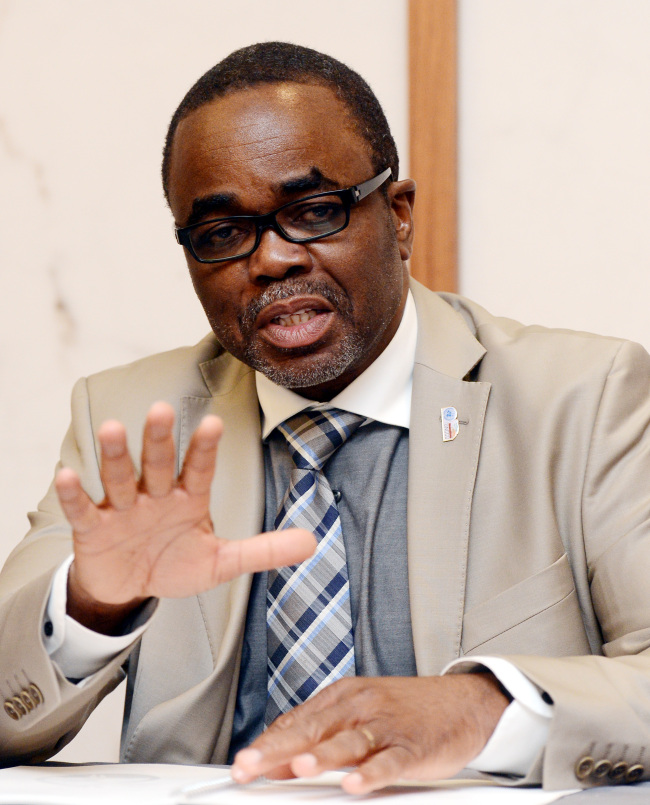UNCCD chief calls for more action against desertification
Education is the best way to address desertification issue, says Gnacadja
By Korea HeraldPublished : June 28, 2013 - 20:20
The head of the world’s only legally binding convention fighting desertification urged Koreans to join the international movement to stop land degradation and revive the land for human survival.
“Enhance soil and enhance human life. Korean people should also participate in efforts to stem desertification of land,” said Luc Gnacadja, executive secretary of the United Nations Convention to Combat Desertification.
“This desertification issue will affect every citizen of the world, whether you are a student, farmer or businessperson.”
“Enhance soil and enhance human life. Korean people should also participate in efforts to stem desertification of land,” said Luc Gnacadja, executive secretary of the United Nations Convention to Combat Desertification.
“This desertification issue will affect every citizen of the world, whether you are a student, farmer or businessperson.”

The UNCCD executive secretary visited Seoul to participate in UNCCD meetings held from June 24-29.
The convention, established after the Rio Earth Summit in 1992, has brought attention to land degradation in dry lands that are home to some of the most vulnerable ecosystems and people in the world.
Desertification was identified as one of the greatest challenges to sustainable development during the Rio summit.
Although desertification can include the encroachment of sand dunes on land, it doesn’t refer to the expansion of deserts, according to the convention.
The term refers to the persistent degradation of dry land ecosystems by human activities ― including unsustainable farming, mining, overgrazing and clear-cutting of land ― and by climate change.

UNCCD data show 2.6 billion people depend on agriculture; 52 percent of the land used for agriculture is moderately or severely affected by soil degradation affecting 1.5 billion people globally and 1.9 billion hectares of land worldwide; around 24 billion tons of fertile soil disappear per year; and desertification affects the global loss of biodiversity as 270,000 species are lost each year.
“As productive land becomes scarcer due to land degradation, issues of migration and instability of society surface, which are not just happening in one country but spreading to many,” said the executive secretary.
In 2005, approximately 15 million people died due to drought and desertification in African countries including Zimbabwe, Zambia, Malawi and Ethiopia.
“The convention’s 195 members work together to improve the living conditions for people in dry lands, to maintain and restore land and soil productivity, and to mitigate the effects of drought,” he said.
The UNCCD encourages the participation of local people in combating desertification and land degradation, while trying to share information of preventive measures with the locals and raise the awareness of the issue.
“The best way to address desertification is through education. Women are especially our targets of education to increase awareness pertaining to desertification because more often than not they are the ones working the land, especially in developing countries,” said Executive Secretary Gnacadja who hails from the Republic of Benin in Africa.
The first time he came to Seoul in 2008, a woman asked him why she should be involved in an initiative to prevent desertification unfolding on the other side of the world, Luc recalled.
He said he had given her an example with cashmere for easy understanding.
As cashmere has become cheaper and cheaper in the market over the last few decades because of increased production in Mongolia, production jumped tenfold. So did the number of livestock.
This accelerated desertification, causing more dust storms in Seoul, he explained.
The chief of the UNCCD said the misuse of land in Asia is particularly concerning, as the region was experiencing desertification in China and Mongolia, which also affects other parts of the world.
“China is losing 12 million hectares of land every year where we could have grown 20 million tons of grain,” he said.
In the last five decades, the number of dust storms blowing from China to Korea has increased fivefold.
He emphasized that more people needed to realize degrading of the soil will make land infertile, eventually reducing cropland.
“Private-sector leaders and policymakers should cooperate and make investments in sustainable use of the land.”
The UNCCD is making efforts by taking measures for forestation and tree regeneration, water management ― saving, reuse of treated water, rainwater harvesting, desalination, or direct use of seawater for salt-loving plants.
Fixating the soil through the use of sand fences, shelter belts, woodlots and windbreaks is also utilized.
At the 10th conference of the UNCCD in 2011, Korea announced the Changwon Initiative, consisting of three components: creating a solid scientific foundation, enriching partnerships and presenting the “Land for Life” Award.
Through the Changwon Initiative and the Land for Life Award, Korea has supported sustainable land management and a set of soil health promotion campaigns.
This came in line with projects to prevent desertification in Central and South America and to combat yellow dust in Northeast Asia.
A series of UNCCD meetings were held from Monday to Saturday in Seoul including the Consultative Experts Meeting on Land Degradation Neutral World, Economics on Land Degradation Interim Report, and an Intersessional COP Bureau Meeting.
These events are to monitor land degradation, seek sustainable development and call for the international community to take actions on imminent land problems.
Gnacadja graduated from the African School of Architecture and Urbanism in Lome, Togo. He became the successful CEO of a consultancy firm and an accomplished manager, honing his skills at the Harvard University Kennedy School of Government and the World Bank Training Institute.
Gnacadja was tapped as the executive secretary of the UNCCD by U.N. Secretary-General Ban Ki-moon in 2007.
By Kim Young-won (wone0102@heraldcorp.com)
-
Articles by Korea Herald


![[Grace Kao] American racism against Stray Kids](http://res.heraldm.com/phpwas/restmb_idxmake.php?idx=644&simg=/content/image/2024/05/13/20240513050827_0.jpg&u=)




![[KH Explains] Naver’s Line dilemma: Lose global footing for cash?](http://res.heraldm.com/phpwas/restmb_idxmake.php?idx=644&simg=/content/image/2024/05/14/20240514050624_0.jpg&u=)


![[Herald Interview] Carbon breakthrough in Korea: Making diamonds at atmospheric pressure](http://res.heraldm.com/phpwas/restmb_idxmake.php?idx=644&simg=/content/image/2024/05/14/20240514050559_0.jpg&u=20240514184059)
![[Graphic News] Only 34% of S. Korean elites favor nuclear arms](http://res.heraldm.com/phpwas/restmb_idxmake.php?idx=644&simg=/content/image/2024/05/13/20240513050852_0.gif&u=)







